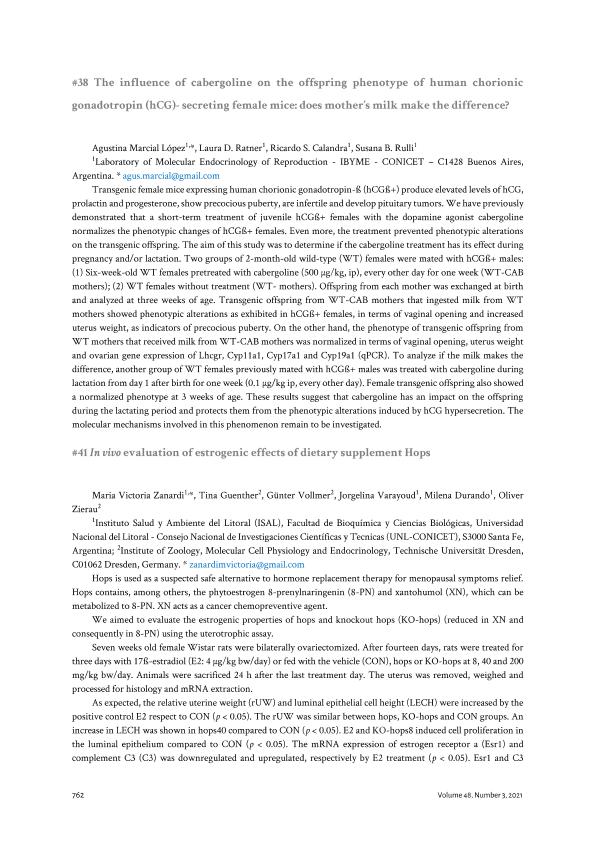Evento
The influence of cabergoline on the offspring phenotype of human chorionic gonadotropin (hCG)- secreting female mice: does mother's milk make the difference?
Marcial López, Carla Agustina ; Ratner, Laura Daniela
; Ratner, Laura Daniela ; Calandra, Ricardo Saul
; Calandra, Ricardo Saul ; Rulli, Susana Beatriz
; Rulli, Susana Beatriz
 ; Ratner, Laura Daniela
; Ratner, Laura Daniela ; Calandra, Ricardo Saul
; Calandra, Ricardo Saul ; Rulli, Susana Beatriz
; Rulli, Susana Beatriz
Tipo del evento:
Virtual
Nombre del evento:
International Symposium on Reproductive Health: overcoming barriers for research in reproduction
Fecha del evento:
07/05/2021
Institución Organizadora:
ISRH2021 1 Scientific and Organizing Committee;
CEFYBO-CONICET;
Universidad de Buenos Aires. Facultad de Medicina;
Título de la revista:
Clinical and Experimental Obstetrics & Gynecology
Editorial:
IMR Press
ISSN:
0390-6663
Idioma:
Inglés
Clasificación temática:
Resumen
Transgenic female mice expressing human chorionic gonadotropin-ß (hCGß +) produce elevated levels of hCG, prolactin and progesterone, show precocious puberty, are infertile and develop pituitary tumors. We have previously demonstrated that a short-term treatment of juvenile hCGß + females with the dopamine agonist cabergoline normalizes the phenotypic changes of hCGß + females. Even more, the treatment prevented phenotypic alterations on the transgenic offspring. The aim of this study was to determine if the cabergoline treatment has its effect during pregnancy and/or lactation. Two groups of 2-month-old wild-type (WT) females were mated with hCGß + males: (1) Six-week-old WT females pretreated with cabergoline (500 µ g/kg, ip), every other day for one week (WT-CAB mothers); (2) WT females without treatment (WT- mothers).
Palabras clave:
TRANSGENIC MICE
,
HUMAN CHORIONIC GONADOTROPIN
,
CABERGOLINE
,
OFFSPRING
Archivos asociados
Licencia
Identificadores
Colecciones
Eventos(IBYME)
Eventos de INST.DE BIOLOGIA Y MEDICINA EXPERIMENTAL (I)
Eventos de INST.DE BIOLOGIA Y MEDICINA EXPERIMENTAL (I)
Citación
The influence of cabergoline on the offspring phenotype of human chorionic gonadotropin (hCG)- secreting female mice: does mother's milk make the difference?; International Symposium on Reproductive Health: overcoming barriers for research in reproduction; Buenos Aires; Argentina; 2021; 1-1
Compartir
Altmétricas



